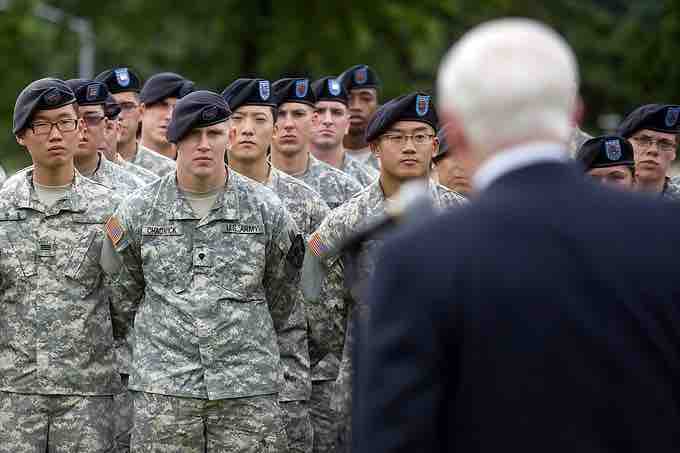National Security Policies
National security policies are policies related to the survival of the state. This security is guaranteed through the use of economic coercion, diplomacy, political power, and the projection of power. This concept developed primarily in the United States after World War II.
Initially focused on military might, national security now encompasses a broad range of concerns. In order to possess national security, a nation needs to possess economic security, energy security, and environmental security, in addition to a strong military. Security threats involve not only conventional foes, such as other nation-states, but also non-state actors, like violent non-state actors (al Queda, for example), narcotic cartels, multinational corporations and non-governmental organizations. Some authorities include natural disasters and other environmentally detrimental events in this category.
Policies and measures taken to ensure national security include:
- Using diplomacy to rally allies and isolate threats
- Marshaling economic power to facilitate or compel cooperation
- Maintaining effective armed forces
- Implementing civil defense and emergency preparedness measures (this includes anti-terrorism legislation)
- Ensuring the resilience of a critical national infrastructure
- Using intelligence services to defeat threats, and,
- Using counterintelligence services to protect the nation from internal threats.
History of National Security Policy
The concept of national security became an official guiding principle of US foreign policy when the National Security Act of 1947 was signed on July 26, 1947, by President Harry S. Truman. Together with its 1949 amendment, this act instantiated important organizations dedicated to American national security, such as the precursor to the Department of Defense. It also subordinated all military branches to the new cabinet level position of the Secretary of Defense, established the National Security Council, and established the Central Intelligence Agency.

CIA Headquarters
In 1949, the Central Intelligence Agency (headquarters depicted here) was established to further the United State's national security.
Current National Security Policies
In 2010, Barack Obama included an all-encompassing world-view in his definition of America's national security interests. His statement prioritized the following.
- The security of the United States, its citizens, and U.S. allies and partners
- A strong, innovative U.S. economy in an open international economic system that promotes opportunity and prosperity
- Respect for universal values at home and around the world
- An international order advanced by U.S. leadership that promotes peace, security, and opportunity through a stronger cooperation to meet global challenges, and,
- Prevention of polarization between Republicans and Democrats
Current national security concerns in the U.S. include the Drug War in Mexico, terrorism, instability in the Middle East, the national debt, and global warming, among others.
Elements of National Security
Military security was the earliest recognized form of national security. Military security implies the capability of a nation to defend itself and/or deter military aggression. Military security also implies the ability of a nation to enforce its policy choices through the use of military force .

US Military Security
Traditionally, military strength has been considered the most important component of national security policies.
The political aspect of security is another important facet of national security. Political security concerns the stability of the social order, and refers to policies related to diplomacy, negotiation, and other interactions.
Economic security is also a part of national security. In today's complex system of international trade, characterized by multi-national agreements, mutual inter-dependence, and limited natural resources, economic security refers to whether or not a nation is free to develop its own economy in the manner desired. Economic security today is, arguably, as important a part of national security as military security.
Environmental security deals with environmental issues. While all environmental events are not considered significant enough to be categorized as threats, many transnational issues, both global and regional, stand to affect national security. These include global warming, deforestation, or conflicts over limited resources.
Energy security, as it relates to natural resources, is a final important component of national security. For a nation to be able to develop its industry and maintain economic competitiveness, it must have available and affordable natural resources.
Tension: Rights Versus Security
Measures adopted to maintain national security have led to an ongoing tension between the preservation of the state, and the rights and freedoms of individual citizens within that state. Although national security measures are imposed to protect society as a whole, many such measures restrict the rights and freedoms of individuals in society. Many are concerned that if national security policies are not subject to good governance, the rule of law, or strict checks and balances, that there is a risk that "national security policy" may simply serve as a pretext for suppressing unfavorable political and social views.
This Phone Is Tapped
The caption on this pay phone reads, "Your conversation is being monitored by the U.S. Government courtesy of the US Patriot Act of 2001. " The PATRIOT Act is an example of the tension between protecting national security and promoting citizen's rights.
In the United States, the controversial USA PATRIOT Act, as well as other recent government actions, has brought some of these issues to public attention. These issues have raised two main questions. First, to what extent, for the sake of national security, should individual rights and freedoms be restricted? Second, can the restriction of civil rights for the sake of national security be justified?